|

The Poisonous Mushroom
|
Consider:
Looking at the captions to the pictures, find all the ways
that these stories would appeal to young German children.
|
|
The Poisonous Mushroom was a
collection of 17 short stories by the Nazi writer
Ernst Hiemer, with pictures by the
Nazi artist Fips.
The purpose of the
stories was to indoctrinate (brainwash) young German children to despise and
hate the Jews. The stories infiltrated the thoughts and beliefs
of German children.
By studying them,
historians can observe how the Nazis thought, and how they taught their
children to think the same way as them.
Cover picture of The Poisonous Mushroom. |
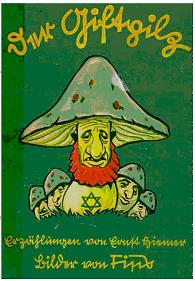
|
|
What made the
stories so particularly powerful was that they did not just portray the Jews
as evil and dangerous people. In the stories, it is young German
children who are the heroes. Sometimes they are able to help and
support their parents by criticising the Jews. Occasionally they
even manage to tell their parents a thing or too. Helping mummy
and daddy, pleasing them and 'getting one over on them' are all things that
are very attractive to children.
In
the first story of the book, a German mother explains to her son how there
are good and bad people, just as there are edible and poisonous mushrooms.
The Jews, she tells him, are a 'poison' within Germany. 'Just as
a single poisonous mushroom can kill a whole family, so a solitary Jew can
destroy a whole village, a whole city, even an entire folk.' she warns him.
|
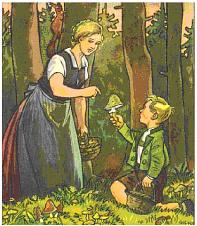
|
|
By thus enticing the
young German readers to empathise with the heroes, the writer was able to
draw German children in to absorbing his opinions. The children
are shown as 'finding out' the truth about the Jews. In doing
so, they prove themselves good boys and girls who please their parents and
teachers.
In
one story, the teacher - a trusted authority who children naturally believe
- teaches the children about Jewish features: 'One can tell a Jew by his
nose. The Jewish nose is bent at the tip. It looks like a figure 6.'
When he turns round the board, the children read and learn this verse:
From a Jew's face The wicked Devil speaks to us,
The Devil who, in every country, Is known as evil plague.
Would we from the Jew be free, Again be gay and happy,
Then must youth fight with us To get rid of the Jewish Devil. |
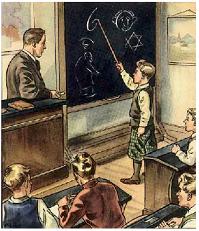
|
|
In the stories,
Jewish people are always presented as evil, dirty and treacherous.
In the text
accompanying this picture, the young German boy is portrayed as crying out
to his brother in horror: 'Those sinister Jewish noses! Those
lousy beards! Those dirty, standing out ears! Those bent legs!
Those flat feet! Those stained, fatty clothes! Look how they move their
hands about! How they haggle! And those are supposed to be men!
|
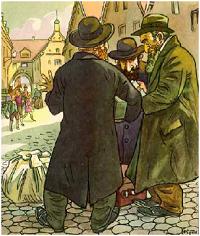
|
|
In a
number of the stories, Jewish men are presented as paedophiles, or as sexual
predators.
In the frightening
story accompanying this picture, a young German girl called Inge is told by
her mother to go to a Jewish doctor. Waiting to see him, she
remembers the warnings of her League of German Girls leader that she should
not go to see a Jewish doctor. When he comes out to her, his
face 'is the face of the Devil. In the middle of this devilish face sits an
enormous crooked nose. Behind the glasses glare two criminal eyes. And a
grin runs across the protruding lips. A grin that wants to say: Now I have
you at last, little German girl!'
The girl runs out of
the surgery, but - when she tells her mother about her experience - 'her
mother lowers her head in shame' and admits that Inge had been right all
along. 'I'm finding out that one can learn even from you
children', Inge's mother admits.
|
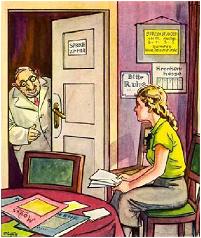
|
|
Other stories depict Jewish people
cheating or harming honest German people - or trying to turn them into
Communists. Throughout the book, the Jews are presented as people who
enjoy it when Germans suffer.
Overall, the stories - one after the
other - present and reinforce, time after time, the ideas that Jewish people
are bad, and that good German children should hate them.
In
this story, a Jewish business man cheats a German farmer out of his land.
The man's son assures his father: 'Daddy, when I have my own farm, no Jew
shall enter my home'. |
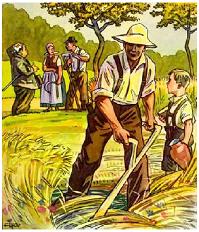
|